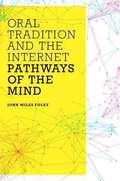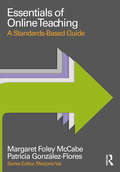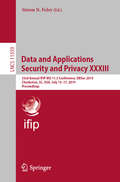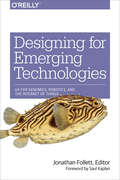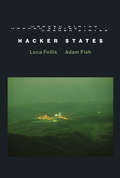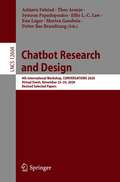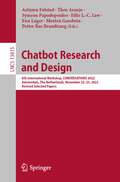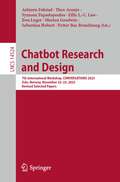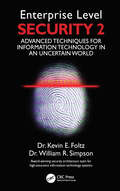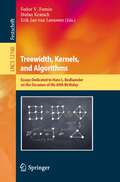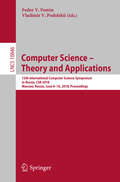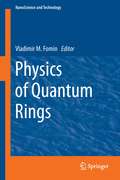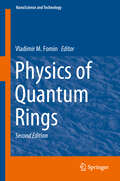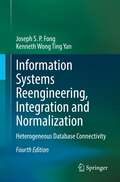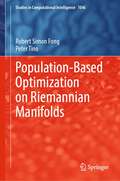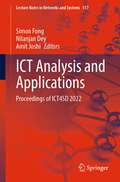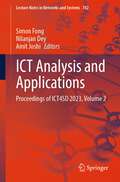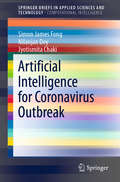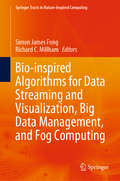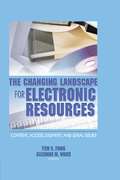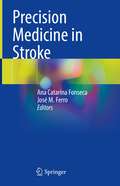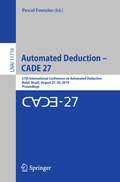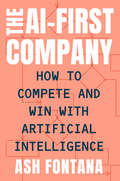- Table View
- List View
Membrane Filtration
by Greg FoleyFocusing on the application of membranes in an engineering context, this hands-on computational guide makes previously challenging problems routine. It formulates problems as systems of equations solved with MATLAB, encouraging active learning through worked examples and end-of-chapter problems. The detailed treatments of dead-end filtration include novel approaches to constant rate filtration and filtration with a centrifugal pump. The discussion of crossflow microfiltration includes the use of kinetic and force balance models. Comprehensive coverage of ultrafiltration and diafiltration processes employs both limiting flux and osmotic pressure models. The effect of fluid viscosity on the mass transfer coefficient is explored in detail, the effects of incomplete rejection on the design and analysis of ultrafiltration and diafiltration are analysed, and quantitative treatments of reverse osmosis and nanofiltration process analysis and design are explored. Includes a chapter dedicated to the modelling of membrane fouling.
Oral Tradition and the Internet: Pathways of the Mind
by John Miles FoleyThe major purpose of this book is to illustrate and explain the fundamental similarities and correspondences between humankind's oldest and newest thought-technologies: oral tradition and the Internet. Despite superficial differences, both technologies are radically alike in depending not on static products but rather on continuous processes, not on "What?" but on "How do I get there?" In contrast to the fixed spatial organization of the page and book, the technologies of oral tradition and the Internet mime the way we think by processing along pathways within a network. In both media it's pathways--not things--that matter. To illustrate these ideas, this volume is designed as a "morphing book," a collection of linked nodes that can be read in innumerable different ways. Doing nothing less fundamental than challenging the default medium of the linear book and page and all that they entail, Oral Tradition and the Internet shows readers that there are large, complex, wholly viable, alternative worlds of media-technology out there--if only they are willing to explore, to think outside the usual, culturally constructed categories. This "brick-and-mortar" book exists as an extension of The Pathways Project (http://pathwaysproject.org), an open-access online suite of chapter-nodes, linked websites, and multimedia all dedicated to exploring and demonstrating the dynamic relationship between oral tradition and Internet technology
Essentials of Online Teaching: A Standards-Based Guide (Essentials of Online Learning)
by Margaret Foley McCabe Patricia González-FloresTeachers’ active online participation and engagement with students are critical factors to the success of online courses. Essentials of Online Teaching is a standards-based, straightforward guide to teaching online in higher education, high school and vocational training, or corporate learning environments. This brief but powerful book encourages immediate application of concepts with the help of real-world examples, technical insights, and professional advice. The guide includes: a practical approach informed by, but not about, relevant learning theories; clear models and examples from a wide variety of online courses; teachers’ reflections about their online practice; a checklist of standards to help guide teaching decisions; and an accompanying website (www.essentialsofonlineteaching.com) with additional resources. Essentials of Online Teaching addresses key instructional challenges in online teaching and presents the reader with practical solutions for each phase of a course—preparation, beginning, middle, and end.
Data and Applications Security and Privacy XXXIII: 33rd Annual IFIP WG 11.3 Conference, DBSec 2019, Charleston, SC, USA, July 15–17, 2019, Proceedings (Lecture Notes in Computer Science #11559)
by Simon N. FoleyThis book constitutes the refereed proceedings of the 33rd Annual IFIP WG 11.3 Conference on Data and Applications Security and Privacy, DBSec 2019, held in Charleston, SC, USA, in July 2018.The 21 full papers presented were carefully reviewed and selected from 52 submissions. The papers present high-quality original research from academia, industry, and government on theoretical and practical aspects of information security. They are organized in topical sections on attacks, mobile and Web security, privacy, security protocol practices, distributed systems, source code security, and malware.
Designing for Emerging Technologies: UX for Genomics, Robotics, and the Internet of Things
by Jonathan FollettThe recent digital and mobile revolutions are a minor blip compared to the next wave of technological change, as everything from robot swarms to skin-top embeddable computers and bio printable organs start appearing in coming years. In this collection of inspiring essays, designers, engineers, and researchers discuss their approaches to experience design for groundbreaking technologies.Design not only provides the framework for how technology works and how it's used, but also places it in a broader context that includes the total ecosystem with which it interacts and the possibility of unintended consequences. If you're a UX designer or engineer open to complexity and dissonant ideas, this book is a revelation.Contributors include:Stephen Anderson, PoetPainter, LLCLisa Caldwell, Brazen UXMartin Charlier, Independent Design ConsultantJeff Faneuff, CarboniteAndy Goodman, Fjord USCamille Goudeseune, Beckman Institute, University of Illinois at Urbana-ChampaignBill Hartman, Essential DesignSteven Keating, MIT Media Lab, Mediated Matter GroupBrook Kennedy, Virginia TechDirk Knemeyer, Involution StudiosBarry Kudrowitz, University of MinnesotaGershom Kutliroff, Omek Studio at IntelMichal Levin, GoogleMatt Nish-Lapidus, NormativeErin Rae Hoffer, AutodeskMarco Righetto, SumAllJuhan Sonin, Involution StudiosScott Stropkay, Essential DesignScott Sullivan, Adaptive PathHunter Whitney, Hunter Whitney and Associates, Inc.Yaron Yanai, Omek Studio at Intel
Hacker States (The Information Society Series)
by Luca Follis Adam FishHow hackers and hacking moved from being a target of the state to a key resource for the expression and deployment of state power.In this book, Luca Follis and Adam Fish examine the entanglements between hackers and the state, showing how hackers and hacking moved from being a target of state law enforcement to a key resource for the expression and deployment of state power. Follis and Fish trace government efforts to control the power of the internet; the prosecution of hackers and leakers (including such well-known cases as Chelsea Manning, Edward Snowden, and Anonymous); and the eventual rehabilitation of hackers who undertake “ethical hacking” for the state. Analyzing the evolution of the state's relationship to hacking, they argue that state-sponsored hacking ultimately corrodes the rule of law and offers unchecked advantage to those in power, clearing the way for more authoritarian rule. Follis and Fish draw on a range of methodologies and disciplines, including ethnographic and digital archive methods from fields as diverse as anthropology, STS, and criminology. They propose a novel “boundary work” theoretical framework to articulate the relational approach to understanding state and hacker interactions advanced by the book. In the context of Russian bot armies, the rise of fake news, and algorithmic opacity, they describe the political impact of leaks and hacks, hacker partnerships with journalists in pursuit of transparency and accountability, the increasingly prominent use of extradition in hacking-related cases, and the privatization of hackers for hire.
Chatbot Research and Design: 4th International Workshop, CONVERSATIONS 2020, Virtual Event, November 23–24, 2020, Revised Selected Papers (Lecture Notes in Computer Science #12604)
by Asbjørn Følstad Theo Araujo Symeon Papadopoulos Effie L.-C. Law Ewa Luger Morten Goodwin Petter Bae BrandtzaegThis book constitutes the proceedings of the 4th International Workshop on Chatbot Research and Design, CONVERSATIONS 2020, which was held during November 23-24, 2020, hosted by the University of Amsterdam. The conference was planned to take place in Amsterdam, The Netherlands, but changed to an online format due to the COVID-19 pandemic.The 14 papers included in this volume were carefully reviewed and selected from a total of 36 submissions. The papers in the proceedings are structured in four topical groups: Chatbot UX and user perceptions, social and relational chatbots, chatbot applications, and chatbots for customer service. The papers provide new knowledge through empirical, theoretical, or design contributions.
Chatbot Research and Design: 6th International Workshop, CONVERSATIONS 2022, Amsterdam, The Netherlands, November 22–23, 2022, Revised Selected Papers (Lecture Notes in Computer Science #13815)
by Asbjørn Følstad Theo Araujo Symeon Papadopoulos Effie L.-C. Law Ewa Luger Morten Goodwin Petter Bae BrandtzaegThis book constitutes the proceedings of the 6th International Workshop on Chatbot Research and Design, CONVERSATIONS 2022, which was held during November 2022.The 12 papers included in this volume were carefully reviewed and selected from a total of 27 submissions. They were organized in topical sections named: chatbot users and user experience; chatbot design and applications.
Chatbot Research and Design: 7th International Workshop, CONVERSATIONS 2023, Oslo, Norway, November 22–23, 2023, Revised Selected Papers (Lecture Notes in Computer Science #14524)
by Asbjørn Følstad Theo Araujo Symeon Papadopoulos Effie L.-C. Law Ewa Luger Morten Goodwin Sebastian Hobert Petter Bae BrandtzaegThis book constitutes the proceedings of the 7th International Workshop on Chatbot Research and Design, CONVERSATIONS 2023, which was held during November 2023.The 12 regular papers were carefully reviewed and selected for inclusion in the book. They were organized in following topical sections: Understanding and Enhancing Conversational Interactions, LLM-driven Conversational Design and Analysis, Ethical Perspectives and Bias, Complementing Perspectives.
Enterprise Level Security 2: Advanced Techniques for Information Technology in an Uncertain World
by Kevin E. Foltz William R. Simpson Institute for Defense AnalysesEnterprise Level Security 2: Advanced Topics in an Uncertain World follows on from the authors&’ first book on Enterprise Level Security (ELS), which covered the basic concepts of ELS and the discoveries made during the first eight years of its development. This book follows on from this to give a discussion of advanced topics and solutions, derived from 16 years of research, pilots, and operational trials in putting an enterprise system together. The chapters cover specific advanced topics derived from painful mistakes and numerous revisions of processes. This book covers many of the topics omitted from the first book including multi-factor authentication, cloud key management, enterprise change management, entity veracity, homomorphic computing, device management, mobile ad hoc, big data, mediation, and several other topics. The ELS model of enterprise security is endorsed by the Secretary of the Air Force for Air Force computing systems and is a candidate for DoD systems under the Joint Information Environment Program. The book is intended for enterprise IT architecture developers, application developers, and IT security professionals. This is a unique approach to end-to-end security and fills a niche in the market.
Treewidth, Kernels, and Algorithms: Essays Dedicated to Hans L. Bodlaender on the Occasion of His 60th Birthday (Lecture Notes in Computer Science #12160)
by Fedor V. Fomin Stefan Kratsch Erik Jan van LeeuwenThis Festschrift was published in honor of Hans L. Bodlaender on the occasion of his 60th birthday. The 14 full and 5 short contributions included in this volume show the many transformative discoveries made by H.L. Bodlaender in the areas of graph algorithms, parameterized complexity, kernelization and combinatorial games. The papers are written by his former Ph.D. students and colleagues as well as by his former Ph.D. advisor, Jan van Leeuwen.
Kernelization: Theory of Parameterized Preprocessing
by Fedor V. Fomin Daniel Lokshtanov Saket Saurabh Meirav ZehaviPreprocessing, or data reduction, is a standard technique for simplifying and speeding up computation. Written by a team of experts in the field, this book introduces a rapidly developing area of preprocessing analysis known as kernelization. The authors provide an overview of basic methods and important results, with accessible explanations of the most recent advances in the area, such as meta-kernelization, representative sets, polynomial lower bounds, and lossy kernelization. The text is divided into four parts, which cover the different theoretical aspects of the area: upper bounds, meta-theorems, lower bounds, and beyond kernelization. The methods are demonstrated through extensive examples using a single data set. Written to be self-contained, the book only requires a basic background in algorithmics and will be of use to professionals, researchers and graduate students in theoretical computer science, optimization, combinatorics, and related fields.
Computer Science – Theory and Applications: 13th International Computer Science Symposium in Russia, CSR 2018, Moscow, Russia, June 6–10, 2018, Proceedings (Lecture Notes in Computer Science #10846)
by Fedor V. Fomin Vladimir V. PodolskiiThis book constitutes the proceedings of the 13th International Computer Science Symposium in Russia, CSR 2018, held in Moscow, Russia, in May 2018.The 24 full papers presented together with 7 invited lectures were carefully reviewed and selected from 42 submissions. The papers cover a wide range of topics such as algorithms and data structures; combinatorial optimization; constraint solving; computational complexity; cryptography; combinatorics in computer science; formal languages and automata; algorithms for concurrent and distributed systems; networks; and proof theory and applications of logic to computer science.
Physics of Quantum Rings
by Vladimir FominThis book deals with a new class of materials, quantum rings. Innovative recent advances in experimental and theoretical physics of quantum rings are based on the most advanced state-of-the-art fabrication and characterization techniques as well as theoretical methods. The experimental efforts allow to obtain a new class of semiconductor quantum rings formed by capping self-organized quantum dots grown by molecular beam epitaxy. Novel optical and magnetic properties of quantum rings are associated with non-trivial topologies at the nanoscale. An adequate characterization of quantum rings is possible on the basis of modern characterization methods of nanostructures, such as Scanning Tunneling Microscopy. A high level of complexity is demonstrated to be needed for a dedicated theoretical model to adequately represent the specific features of quantum rings. The findings presented in this book contribute to develop low-cost high-performance electronic, spintronic, optoelectronic and information processing devices based on quantum rings.
Physics of Quantum Rings (NanoScience and Technology)
by Vladimir M. FominThis book, now in its second edition, introduces readers to quantum rings as a special class of modern high-tech material structures at the nanoscale. It deals, in particular, with their formation by means of molecular beam epitaxy and droplet epitaxy of semiconductors, and their topology-driven electronic, optical and magnetic properties. A highly complex theoretical model is developed to adequately represent the specific features of quantum rings. The results presented here are intended to facilitate the development of low-cost high-performance electronic, spintronic, optoelectronic and information processing devices based on quantum rings. This second edition includes both new and significantly revised chapters. It provides extensive information on recent advances in the physics of quantum rings related to the spin-orbit interaction and spin dynamics (spin interference in Rashba rings, tunable exciton topology on type II InAs/GaAsSb quantum nanostructures), the electron-phonon interaction in ring-like structures, quantum interference manifestations in novel materials (graphene nanoribbons, MoS2), and the effects of electrical field and THz radiation on the optical properties of quantum rings. The new edition also shares insights into the properties of various novel architectures, including coupled quantum ring-quantum dot chains and concentric quantum rings, topologic states of light in self-assembled ring-like cavities, and optical and plasmon m.odes in Möbius-shaped resonators.
Information Systems Reengineering, Integration and Normalization: Heterogeneous Database Connectivity
by Joseph S. Fong Kenneth Wong Ting YanDatabase technology is an important subject in Computer Science. Every large company and nation needs a database to store information. The technology has evolved from file systems in the 60’s, to Hierarchical and Network databases in the 70’s, to relational databases in the 80’s, object-oriented databases in the 90’s, and to XML documents and NoSQL today. As a result, there is a need to reengineer and update old databases into new databases. This book presents solutions for this task.In this fourth edition, Chapter 9 - Heterogeneous Database Connectivity (HDBC) offers a database gateway platform for companies to communicate with each other not only with their data, but also via their database. The ability of sharing a database can contribute to the applications of Big Data and surveys for decision support systems. The HDBC gateway solution collects input from the database, transfers the data into its middleware storage, converts it into a common data format such as XML documents, and then distributes them to the users. HDBC transforms the common data into the target database to meet the user’s requirements, acting like a voltage transformer hub. The voltage transformer converts the voltage to a voltage required by the users. Similarly, HDBC transforms the database to the target database required by the users.This book covers reengineering for data conversion, integration for combining databases and merging databases and expert system rules, normalization for eliminating duplicate data from the database, and above all, HDBC connects all legacy databases to one target database for the users.The authors provide a forum for readers to ask questions and the answers are given by the authors and the other readers on the Internet.
Population-Based Optimization on Riemannian Manifolds (Studies in Computational Intelligence #1046)
by Robert Simon Fong Peter TinoManifold optimization is an emerging field of contemporary optimization that constructs efficient and robust algorithms by exploiting the specific geometrical structure of the search space. In our case the search space takes the form of a manifold. Manifold optimization methods mainly focus on adapting existing optimization methods from the usual “easy-to-deal-with” Euclidean search spaces to manifolds whose local geometry can be defined e.g. by a Riemannian structure. In this way the form of the adapted algorithms can stay unchanged. However, to accommodate the adaptation process, assumptions on the search space manifold often have to be made. In addition, the computations and estimations are confined by the local geometry.This book presents a framework for population-based optimization on Riemannian manifolds that overcomes both the constraints of locality and additional assumptions. Multi-modal, black-box manifold optimization problems on Riemannian manifolds can be tackled using zero-order stochastic optimization methods from a geometrical perspective, utilizing both the statistical geometry of the decision space and Riemannian geometry of the search space.This monograph presents in a self-contained manner both theoretical and empirical aspects of stochastic population-based optimization on abstract Riemannian manifolds.
ICT Analysis and Applications: Proceedings of ICT4SD 2022 (Lecture Notes in Networks and Systems #517)
by Simon Fong Nilanjan Dey Amit JoshiThis book proposes new technologies and discusses future solutions for ICT design infrastructures, as reflected in high-quality papers presented at the 7th International Conference on ICT for Sustainable Development (ICT4SD 2022), held in Goa, India, on July 29–30, 2022. The book covers the topics such as big data and data mining, data fusion, IoT programming toolkits and frameworks, green communication systems and network, use of ICT in smart cities, sensor networks and embedded system, network and information security, wireless and optical networks, security, trust, and privacy, routing and control protocols, cognitive radio and networks, and natural language processing. Bringing together experts from different countries, the book explores a range of central issues from an international perspective.
ICT Analysis and Applications: Proceedings of ICT4SD 2023, Volume 2 (Lecture Notes in Networks and Systems #782)
by Simon Fong Nilanjan Dey Amit JoshiThis book proposes new technologies and discusses future solutions for ICT design infrastructures, as reflected in high-quality papers presented at the 8th International Conference on ICT for Sustainable Development (ICT4SD 2023), held in Goa, India, on August 3–4, 2023. The book covers the topics such as big data and data mining, data fusion, IoT programming toolkits and frameworks, green communication systems and network, use of ICT in smart cities, sensor networks and embedded system, network and information security, wireless and optical networks, security, trust, and privacy, routing and control protocols, cognitive radio and networks, and natural language processing. Bringing together experts from different countries, the book explores a range of central issues from an international perspective.
Artificial Intelligence for Coronavirus Outbreak (SpringerBriefs in Applied Sciences and Technology)
by Simon James Fong Nilanjan Dey Jyotismita ChakiThis book examines how the wonders of AI have contributed to the battle against COVID-19. Just as history repeats itself, so do epidemics and pandemics. In the face of the novel coronavirus disease, COVID-19, the book explores whether, in this digital era where artificial intelligence is successfully applied in all areas of industry, we are doing any better than our ancestors did in dealing with pandemics. One of the most contagious diseases ever known, COVID-19 is spreading like wildfire around and has cost thousands of human lives.The book discusses how AI can help fight this deadly virus, from early warnings, prompt emergency responses, and critical decision-making to surveillance drones. Serving as a technical reference resource, data analytic tutorial and a chronicle of the application of AI in epidemics, this book will appeal to academics, students, data scientists, medical practitioners, and anybody who is concerned about this global epidemic.
Bio-inspired Algorithms for Data Streaming and Visualization, Big Data Management, and Fog Computing (Springer Tracts in Nature-Inspired Computing)
by Simon James Fong Richard C. MillhamThis book aims to provide some insights into recently developed bio-inspired algorithms within recent emerging trends of fog computing, sentiment analysis, and data streaming as well as to provide a more comprehensive approach to the big data management from pre-processing to analytics to visualization phases. The subject area of this book is within the realm of computer science, notably algorithms (meta-heuristic and, more particularly, bio-inspired algorithms). Although application domains of these new algorithms may be mentioned, the scope of this book is not on the application of algorithms to specific or general domains but to provide an update on recent research trends for bio-inspired algorithms within a specific application domain or emerging area. These areas include data streaming, fog computing, and phases of big data management. One of the reasons for writing this book is that the bio-inspired approach does not receive much attention but shows considerable promise and diversity in terms of approach of many issues in big data and streaming. Some novel approaches of this book are the use of these algorithms to all phases of data management (not just a particular phase such as data mining or business intelligence as many books focus on); effective demonstration of the effectiveness of a selected algorithm within a chapter against comparative algorithms using the experimental method. Another novel approach is a brief overview and evaluation of traditional algorithms, both sequential and parallel, for use in data mining, in order to provide an overview of existing algorithms in use. This overview complements a further chapter on bio-inspired algorithms for data mining to enable readers to make a more suitable choice of algorithm for data mining within a particular context. In all chapters, references for further reading are provided, and in selected chapters, the author also include ideas for future research.
The Changing Landscape for Electronic Resources: Content, Access, Delivery, and Legal Issues
by Yem S Fong Suzanne M WardKeep up-to-date with the latest in innovative electronic information services! The Changing Landscape for Electronic Resources: Content, Access, Delivery, and Legal Issues focuses on the effects and challenges of providing electronic resources for libraries. The authors are librarians and other professionals with practical experience in current issues and developing trends. With this book, you will learn about technical, legal, and resource sharing developments that will contribute to the future distribution of global information in libraries. This book shows how libraries using electronic resources can reduce costs and save transaction time for large and small public libraries as well as academic libraries. It also reveals recent initiatives related to open source software and core standards for resource sharing and interlibrary loal, such as the Bath profile and the NISO Circulation Interchange Protocol (NCIP). Special features of this timely book include figures, diagrams, references, and Web sites. This book contains the wisdom and experience of professionals applying electronic resources to: interlibrary loan systems copyright and licensing open source software international data standards scholarly publishingThe Changing Landscape for Electronic Resources will help you avoid many of the potential pitfalls of managing electronic content in the evolving modern library. This book will help you prepare for a future in which electronic access improves the range, speed, and quantity of cost-effective information services for patrons and resource-sharing partners.
Precision Medicine in Stroke
by Ana Catarina Fonseca José M. FerroThis book provides a comprehensive coverage of the state of the art in precision medicine in stroke. It starts by explaining and giving general information about precision medicine. Current applications in different strokes types (ischemic, haemorrhagic) are presented from diagnosis to treatment. In addition, ongoing research in the field (early stroke diagnosis and estimation of prognosis) is extensively discussed. The final part provides an in-depth discussion of how different interdisciplinary areas like artificial intelligence, molecular biology and genetics are contributing to this area.Precision Medicine in Stroke provides a practical approach to each chapter, reinforcing clinical applications and presenting clinical cases. This book is intended for all clinicians that interact with stroke patients (neurologists, internal medicine doctors, general practitioners, neurosurgeons), students and basic researchers.
Automated Deduction – CADE 27: 27th International Conference on Automated Deduction, Natal, Brazil, August 27–30, 2019, Proceedings (Lecture Notes in Computer Science #11716)
by Pascal FontaineThis book constitutes the proceeding of the 27th International Conference on Automated Deduction, CADE 27, held in Natal, Brazil, in August 2019. The 27 full papers and 7 system descriptions presented were carefully reviewed and selected from 65 submissions. CADE is the major forum for the presentation of research in all aspects of automated deduction, including foundations, applications, implementations, and practical experience.
The AI-First Company: How to Compete and Win with Artificial Intelligence
by Ash FontanaArtificial Intelligence is transforming every industry, but if you want to win with AI, you have to put it first on your priority list.AI-First companies are the only trillion-dollar companies, and soon they will dominate even more industries, more definitively than ever before. These companies succeed by design--they collect valuable data from day one and use it to train predictive models that automate core functions. As a result, they learn faster and outpace the competition in the process. Thankfully, you don't need a Ph.D. to learn how to win with AI. In The AI-First Company, internationally-renowned startup investor Ash Fontana offers an executable guide for applying AI to business problems. It's a playbook made for real companies, with real budgets, that need strategies and tactics to effectively implement AI. Whether you're a new online retailer or a Fortune 500 company, Fontana will teach you how to: • Identify the most valuable data; • Build the teams that build AI; • Integrate AI with existing processes and keep it in check; • Measure and communicate its effectiveness; • Reinvest the profits from automation to compound competitive advantage.If the last fifty years were about getting AI to work in the lab, the next fifty years will be about getting AI to work for people, businesses, and society. It's not about building the right software -- it's about building the right AI. The AI-First Company is your guide to winning with artificial intelligence.

